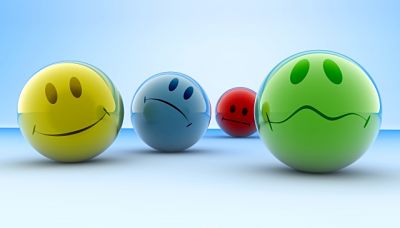 As a therapist I spend a great deal of my time talking to clients about their emotions. For some clients this is no problem, they live in an emotional world. For others I can ask what they are feeling and I see a look of confusion descend. Some of us are good with emotions; some of us are good at hiding them. We all have them.
As a therapist I spend a great deal of my time talking to clients about their emotions. For some clients this is no problem, they live in an emotional world. For others I can ask what they are feeling and I see a look of confusion descend. Some of us are good with emotions; some of us are good at hiding them. We all have them.
I can remember the first time I came across the concept that there are only four emotions. It was explained to me that humans are happy, sad, angry or scared. Eric Berne, the father of Transactional Analysis even dismissed anger as a racket feeling, which would leave us with three. The explanation continued with the statement that all other emotions are a combination of the four. Jealousy, for example, is a combination of anger and scare. Boredom is just another way of saying we feel angry.
Whilst I agree that this is a blatant oversimplification of the vast emotional spectrum we experience, I like the simplicity of it. It’s a great way of getting to the bottom of our feelings and reduces the chance that we will use language to deny our real feelings. It’s like saying you are annoyed when really you mean you feel angry. Anger feels much more genuine and is more likely to lead to constructive change. It moves away from the passivity of “annoyed”.
All emotions are OK and all have a valuable part to play in keeping us on an even keel. Here’s a quick rundown of what they do for us:
Happiness
This one, I don’t have to explain! When we feel happy the world is great, everything is fine and we want for nothing. Unfortunately though, there is a common misconception that this is how we should feel all the time. Imagine if we did. Happiness would become normality. How would we then distinguish the great times from the rest of our lives? Being happy all the time is an unrealistic expectation that, ironically, decreases the chance that you will feel happy because you become angry at your lack of happiness! I’m going to stop there with that one because I’m tying myself in emotional knots!
Sadness
This is the bad boy of the gang. No one likes to be sad. Sadness has got a bad press (I feel sad for sad). Sadness gives us permission to slow down, do less, withdraw from the world and do what we need to do in order to successfully get on with our lives again once we ready. We may have heard bad news, been let down or even lost someone close to us. Sadness is there to give us time to sort this out in our head. It’s OK to be sad. It’s useful and just as important as happiness over the course of our lives. Give yourself permission to go with it and it will pass, and you will have grown.
Anger
Anger can give us the energy to change situations that are pissing us off! The rush of adrenaline, the focused mind, these could save us from harm or pull us out of bad situations. Anger is readily embraced by some, hence the need for “anger management“, but for all of us anger can result in change for the better if used appropriately.
Fear
Fear keeps us safe and protects us from dangerous situations. Fear can also hold you back from doing all things in life you’d like to. In therapeutic terms it’s important to distinguish between fear, which is rational and from the Adult ego state, and scare, which is from the Child ego state. It’s that scare, which kept us safe when we were kids, but can be a block now we are adults. During the process of therapy, many people learn to let go of those scary feelings about issues we have echoing from our childhood and move on with our lives.
I make no apologies for repeating this next statement; all emotions are OK. They are all equal. When they get out of balance we may need help to adjust. Too much of any of them might not be useful for us and could lead to depression, anxiety or anger issues. But pushing our emotions away just moves those feelings inside and they manifest in other ways, often through physical illnesses or stress. So don’t deny them, be with your emotions and they will serve you well.
